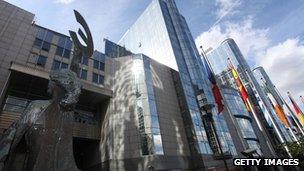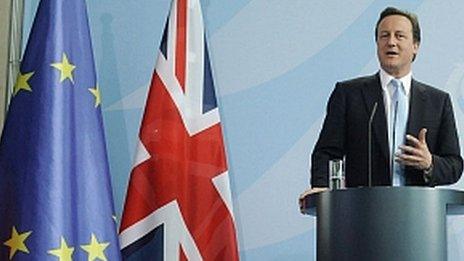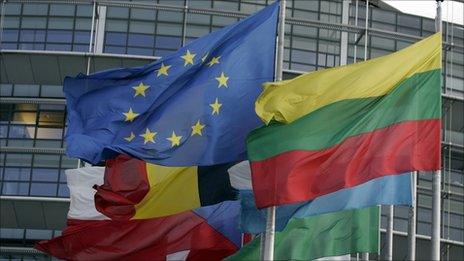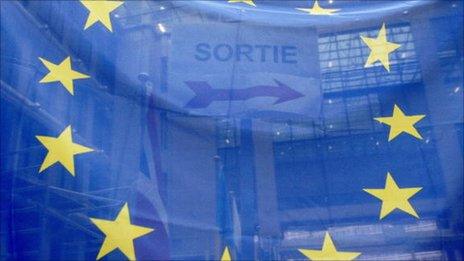Europe: The bomb's ticking louder
- Published
- comments

The PM will meet with other EU leaders in Brussels at the weekend
William Hague once warned David Cameron that Europe was "a ticking bomb" which could blow up the Conservative party. The ticking just got louder.
I had a "back to the future" feeling when the Today programme's lead item this morning was one Conservative MP arguing with another about Europe, external.
I felt almost nostalgic for the Major years. Not so the prime minister and the foreign secretary who remember the fatal divisions in their party over Europe all too well.
The question now facing them is how to avoid a dangerous fissure opening up as a result of Monday's Commons vote on an EU referendum.
If the government sticks to its public line - a three-line whip to oppose giving the public their first vote on Europe since 1975 - that's just what they'll get.
The vote will not be binding on the government (that's because it's a backbench debate triggered under a new mechanism which allows petitions with more than 100,000 signatures to be given Commons time). Unless Labour decides to abstain to cause the prime minister trouble there is little chance it would be passed.
That's what Labour's former leader John Smith did to John Major over the Maastricht Treaty but, as yet, all the signs are that Ed Miliband will whip his MPs into opposing the referendum.
However, the wounds of a substantial rebellion on Europe would not quickly heal.
Postponement possiblilty
The Tory backbenchers' shop steward, Graham Brady, is proposing a "free vote" of Tory backbenchers with ministers abstaining.
The chairman of the 1922 Committee writes in today's Telegraph, external that: "this is a backbench debate, and there is no need for ministers to participate. What matters is that backbench MPs of all parties should be free to vote in accordance with our beliefs and in the interests of our constituents.

MP Graham Brady was shadow Europe minister in 2004-2007
"The Coalition Agreement commits ministers to examining 'the balance of the EU's existing competences'. I believe that a clear vote in the Commons next week will strengthen their hand in negotiations, as the debate on votes for prisoners did last February."
There is another proposal coming from the sort of Eurosceptics with whom the government can do business.
It's an amendment to the referendum motion promising a White Paper to examine "the balance of the EU's existing competences" with the promise of a referendum at a future date.
The wording of any such amendement would have not just to satisfy potential rebels but also the Speaker. Unless it includes a promise of a referendum it might be categorised as a "wrecking amendment" and, therefore, not put to the vote.
The first idea would open up a gulf between ministers and their backbenchers. The second has been designed to be as acceptable as possible to the Liberal Democrats but could, nevertheless, open divisions between the two halves of the coalition.
If neither of these ideas prove acceptable to David Cameron he'll have to give something else to quieten those who've been told for years not to "obsess" about Europe and now feel that events have proved them right.
Incidentally, some have wondered whether Liam Fox might step forward to lead the calls for a referendum. I hear that he will not.
PS. Arguably the much bigger story about Europe is the continuing failure of France and Germany to agree about how to rescue the eurozone.
Last night President Sarkozy left his wife's bedside without waiting for the arrival of their new baby daughter. He flew instead to Frankfurt for the leaving party for the Head of the European Central Bank where he just happened to bump into the chancellor of Germany and president of the European Commission.
There was no deal over drinks. The French want the ECB to cover the euro bailout. The Germans insist that that would be to undermine the bank's historic role to control inflation.
The markets are watching as Europe fails to get its act together. This is, as one well-informed watcher put it, serious edge-of-the-cliff stuff.
- Published21 October 2011

- Published19 October 2011

- Published17 October 2011
